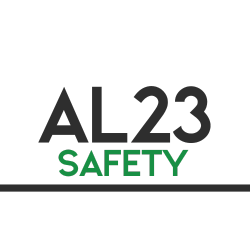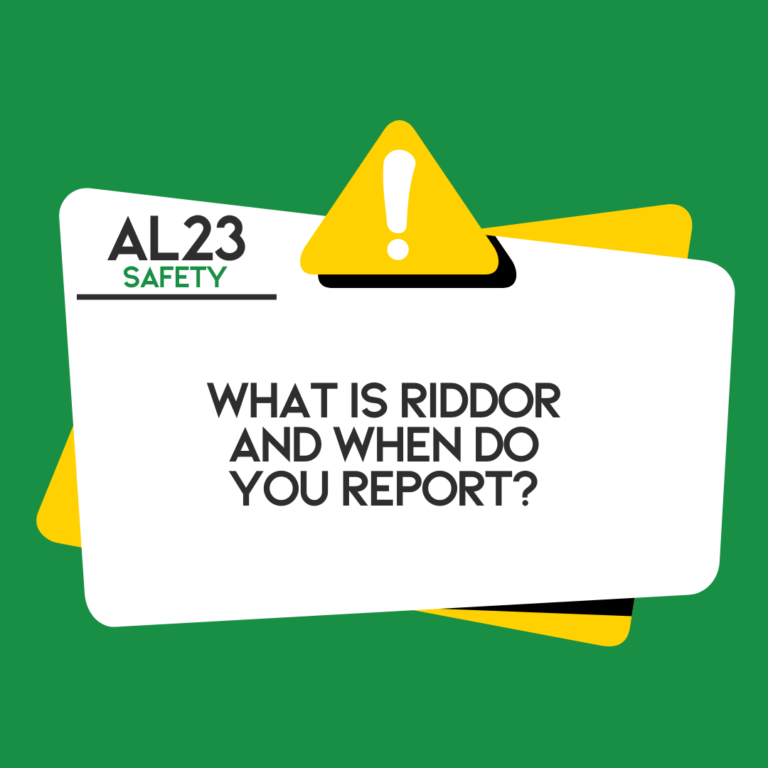What is RIDDOR and Why is it Important?
RIDDOR (Reporting of Injuries, Diseases and Dangerous Occurrences Regulations) is a crucial piece of UK health and safety legislation that requires employers, self-employed people, and those in control of premises to report certain serious workplace accidents, occupational diseases, and specified dangerous occurrences (near misses). These RIDDOR reporting requirements form a fundamental part of maintaining workplace safety across the United Kingdom.
At AL23 Safety, we understand that navigating Reporting of Injuries, Diseases and Dangerous Occurrences Regulations regulations can be challenging for businesses of all sizes. That’s why our team of health and safety experts is dedicated to providing comprehensive support to ensure your organisation remains fully compliant with all aspects of RIDDOR.
When Must You Report Under RIDDOR?
Understanding when to report under RIDDOR is essential for legal compliance. The Health and Safety Executive (HSE) has established clear criteria for reportable incidents. Here’s a breakdown of what must be reported:
Reportable Injuries
Under RIDDOR reporting requirements, certain injuries must be reported when they occur in connection with work:
- Deaths: All deaths to workers and non-workers must be reported if they arise from a work-related accident, including acts of physical violence.
- Specified Injuries to Workers: These include:
- Fractures (excluding fingers, thumbs, and toes)
- Amputations
- Permanent loss or reduction of sight
- Crush injuries leading to internal organ damage
- Serious burns covering more than 10% of the body
- Scalping requiring hospital treatment
- Unconsciousness caused by head injury or asphyxia
- Any injury arising from working in an enclosed space
- Over-7-day Injuries: Injuries that result in a worker being away from work or unable to perform their normal duties for more than seven consecutive days (not counting the day of the accident).
Reportable Occupational Diseases
Reporting of Injuries, Diseases and Dangerous Occurrences Regulations incident reporting also covers certain workplace-related diseases, including:
- Carpal tunnel syndrome
- Severe cramp of the hand or forearm
- Occupational dermatitis
- Hand-arm vibration syndrome
- Occupational asthma
- Tendonitis or tenosynovitis of the hand or forearm
- Any occupational cancer
- Any disease attributed to occupational exposure to a biological agent
Dangerous Occurrences
Dangerous occurrences are specific near-miss events that don’t result in reportable injury but have the potential to cause significant harm. There are 27 categories of dangerous occurrences that require reporting under RIDDOR UK regulations, including:
- Collapse of lifting equipment
- Explosion or fire causing work suspension for over 24 hours
- Accidental release of a biological agent
- Failure of breathing apparatus
- Electrical incidents causing explosion or fire
Gas Incidents
Registered gas engineers must report dangerous gas fittings they find, and gas conveyors/suppliers must report certain incidents, including gas escapes, fires, or explosions connected to gas they’ve supplied.
How to Report Under RIDDOR
RIDDOR reporting involves notifying the relevant enforcing authority using the appropriate reporting method:
- For fatal and specified injuries: Report immediately by telephone to the HSE Incident Contact Centre, followed by a report within 10 days.
- For over-7-day injuries: Report within 15 days of the incident.
- For occupational diseases: Report as soon as a doctor notifies you that your employee suffers from a reportable work-related disease.
- For dangerous occurrences: Report immediately by telephone, followed by a report within 10 days.
Reports can be submitted online through the HSE website, and records must be kept for at least three years from the date of the incident.
Common Compliance Challenges
Many organisations struggle with RIDDOR compliance due to:
- Uncertainty about what constitutes a reportable incident
- Confusion over reporting deadlines
- Limited understanding of the legal requirements
- Inadequate record-keeping systems
- Lack of trained staff to handle reporting procedures
How AL23 Safety Can Help With Your Compliance
At AL23 Safety, we specialise in helping businesses navigate the complexities of RIDDOR UK regulations. Our expert consultants provide:
- Comprehensive RIDDOR Training: We deliver tailored training sessions to ensure your team understands what RIDDOR is and when incidents must be reported.
- Incident Investigation Support: Our experts can help determine whether an incident is reportable under RIDDOR and assist with thorough investigations.
- Compliance Audits: We conduct detailed audits of your current reporting procedures, identifying gaps and recommending improvements.
- Documentation Systems: We implement robust systems for recording incidents and tracking reporting deadlines.
- Ongoing Support: Our team provides continuous guidance on maintaining RIDDOR compliance as regulations evolve.
Why Choose AL23 Safety for Compliance?
Our clients trust us because we deliver:
- Expert Knowledge: Our consultants stay up-to-date with the latest RIDDOR requirements and HSE guidance.
- Practical Solutions: We provide clear, actionable advice tailored to your specific industry and business needs.
- Proactive Approach: We help you develop preventative strategies to reduce reportable incidents.
- Peace of Mind: With our support, you can be confident that your RIDDOR reporting obligations are being met.
Conclusion
Understanding what RIDDOR is and when to report under RIDDOR is essential for any UK business. Proper RIDDOR incident reporting not only ensures legal compliance but also contributes to safer workplaces and reduced accident rates.
Don’t risk non-compliance with UK regulations. Contact AL23 Safety today for expert assistance with all aspects of reporting requirements. Our team is ready to help you navigate these important health and safety obligations with confidence and expertise.
For more information or to book a consultation or call our dedicated compliance team.

